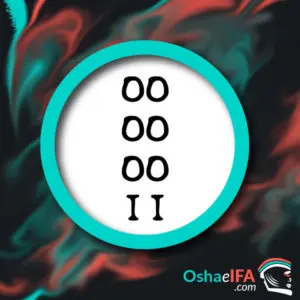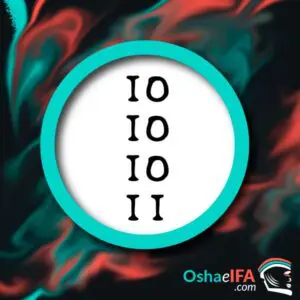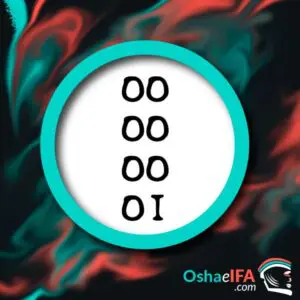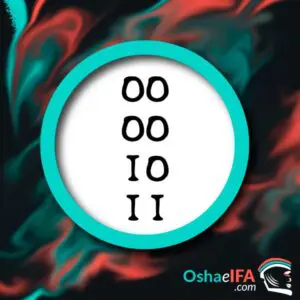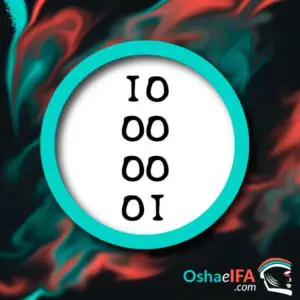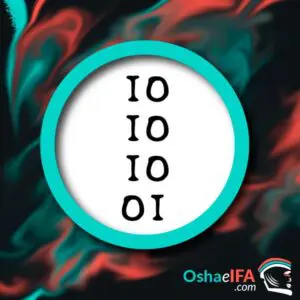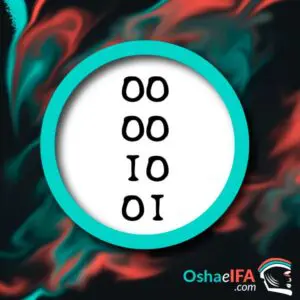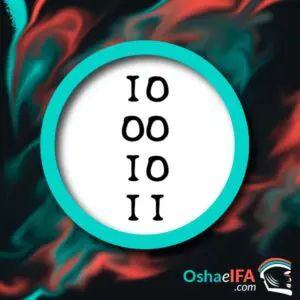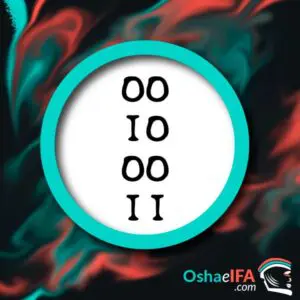Okana Irete (Okana Wete)

Okana Irete (Okana Wete), is the Odu of Ifa #134 in the lordly order of Ifa, is a sign marked by creativity and transformation, it reflects the duality of human existence, the constant struggle between creation and destruction, passion and disdain.
General Description of the Odu Okana Irete:
Names or Aliases:
- Okana Irete.
- Okana Wete.
- Okana Rete.
- Okanran Irete.
- Okana Guete
What is born in the odu of Ifá Okana Irete?
- Ishona Agba Igui, the spirit of the wood carvers.
- The art of carving wood.
- Asia Akefun, Elegua's brother, was going.
- The practice of giving white guanajo to Elegbara.
- The chills.
- A Hey He is given a scythe with peacock, guanajo and tiñosa feathers.
- To avoid separation, the couple must sleep crossed.
- Osanyin is called Sara-Ekó.
- When the Okana Irete sign appears, Shangó is given a one-eyed rooster before 7 days.
- The guanajo's wife fell in love with the peacock.
- The guanajo chained the peacock.
- It is necessary to give food to the head.
What does the Okana Irete sign talk about?
- It talks about the war between the totí and the guanajo.
- The man who prostitutes the woman and manages her money.
- Illnesses include chills, problems with the digestive, cardiovascular, circulatory systems, kidneys, lower extremities, blood, throat and nose.
- The Odu Okana Irete indicates a long life with great government and great secrets.
- Prohibits the consumption of corn and rice husks.
- It has the protection of a man spirit that prevents its destruction.
- The consultant's own people betray him.
- The person may seem clumsy, but they are not.
The Okana Wete sign points out:
- The importance of taking care of edged weapons.
- The punishment for the Awó who abuses or lives with his goddaughter.
- The existence of Abiku children.
- Okana Irete warns about poisoning.
- Mentions the jumping Awó.
You may also like: Ifa Irete Kana sign
Analysis and Interpretation of the Odu Okana Irete
Okana Irete's primary teaching is transformation and the ability to reinvent oneself in the face of challenges. This Odu warns about the importance of being cautious with the decisions we make, especially regarding the management of our personal and professional relationships. The story of the Guanajo woman and the Peacock reminds us that actions driven by uncontrolled passion can have fatal consequences.
Economic Aspects:
Economically, Okana Irete suggests a period of caution. The ability to carve wood translates into the ability to find and exploit unsaturated market niches. However, the presence of poisoning and betrayal indicates that financial decisions should be made with great caution, avoiding unnecessary risks and making sure not to blindly trust partners or deals that seem too good to be true.
Health:
Health in this Odu requires special attention to the digestive and cardiovascular systems, as well as cold-related conditions, such as chills. Spiritual teachings suggest the need to feed the head, symbolically speaking, with positive thoughts and actions that reinforce our physical and spiritual well-being.
Religious Aspects:
Religiously, Okana Irete emphasizes the importance of devotion and respect towards the Orishas, especially Oyá, Osanyin, and Shango. Specific offerings and rituals, such as giving a white guanajo to Elegua or a one-eyed rooster to Shangó, are crucial to maintaining spiritual harmony and protecting oneself from adversity. This sign also warns against the abuse of spiritual power, highlighting the need to maintain ethical conduct in religious practice.
Personal Relationships (Love):
In love, Okana Irete advises caution against the temptations of adultery and infidelity, highlighting the devastating consequences that these actions can bring. The recommendation that married couples sleep crossed symbolizes the need to maintain a balanced and complementary perspective in the relationship, working together but respecting individual spaces. This Odu also talks about the importance of honesty and transparency with loved ones to avoid misunderstandings and conflicts.
Recommendations
- Cultivate and Value the Art of Wood Carving: This symbolizes the ability to transform the raw into something beautiful and meaningful, reflecting the importance of creativity and personal transformation.
- Respect and Offerings to the Orishas:
- Give a white guanajo to Elegbara to encourage clarity and protection on the path.
- Offer a scythe with Peacock, Guanajo and Tiñosa feathers to Oyá, symbolizing protection and transformation.
- Place Sara-Ekó to Osanyin, in search of health and well-being.
- Deliver a one-eyed rooster to Shango within seven days to strengthen justice and personal authority.
- Maintain Marriage Traditions: Sleep crossed to avoid separation, representing union and balance in the relationship.
- Praying Head: To strengthen the spirit and mind, promoting clarity and spiritual protection.
- Be careful with the management of personal relationships: Avoid adultery and impulsive actions that can lead to negative consequences.
- Protection and Caution:
- Avoid wear and tear due to betrayal or deception.
- Protect yourself from attacks with knives.
- Be cautious with strangers and with those who may seem like friends or lovers.
prohibitions
- Avoid Eating Corn and Rice Husks: These foods are prohibited under this Odu, possibly due to their connection with negative aspects or unfavorable energies.
- Do not give or lend personal clothing: Doing so may transfer personal luck to another, causing delays or losses of one's own.
- Caution Against Abuse of Spiritual Power: Specifically, the Awó must avoid inappropriate relationships with his godchildren, which can lead to spiritual punishments.
- Beware of Betrayal and Disloyalty: Both personally and communally, this Odu warns about the possibility of being betrayed by those close to you.
- Avoid Actions That May Lead to Poisoning or Deception: This includes both physical and spiritual or emotional poisoning.
Sayings of the Odu of Ifá Okana Irete:
- Menéalo, who has the sugar down.
- Shame is the justice of man.
- Justice is Olorun's revenge.
- All the birds eat rice and Totí bears the blame.
"Shame is the justice of man" suggests that remorse and conscience act as regulators of our actions. The shame we feel after making a mistake is an internal correction mechanism, propelling us toward repentance and personal improvement. This saying highlights the importance of self-evaluation and rectification as pillars for ethical and moral growth.
Odu Okana Wete Ifa Code of Ethics:
- The Awó calmly reaches his destination.
Discover: What are Elegua's children like? Main features.
Meaning of the Ifá Sign Okana Irete:
- Okana Irete focuses on the art of wood carving, giving rise to the great Spirit ISHONA AGBA IGUI, patron saint of wood carvers.
- In this sign, the story is told of the woman from Guanajo who fell in love with the Peacock, and how the latter poisoned her. This story warns about the dangers of adultery and the consequences of uncontrolled passions.
- According to this Odu, it is prohibited to consume corn in any form and rice husks. Also mentioned is the creation of a fan adorned with Peacock feathers, intended for the Oshas to attract the Iré Ayé Umbo.
- The importance of head prayer is highlighted to strengthen the spirit and mind, promoting clarity and spiritual protection.
- Okana Irete recounts the war between the Totí and the Guanajo, illustrating how the actions of one can affect many, and how the Totí ends up taking the blame for everyone.
- When this Odu appears to a son of Elegua, he is instructed to offer a Tolo-Tolo (guanajo) to his Elegua, and repeat this sacrifice when making Santo.
- The Awó Okana Wete must be especially careful with his son, performing ceremonies before Shangó to protect him, since there is a risk of losing him due to an accident.
- This sign warns against lending or donating personal items, as doing so could transfer the owner's fortune to another person.
- Regarding health, this Odu indicates problems related to chills, the digestive system and the heart.
- To protect and strengthen the marriage, it is recommended that spouses sleep in crossed positions, symbolizing union and balance.
- Osanyin is offered a güiro with Sara-Ekó, and both Osanyin and Oggún can be offered pigeons.
- The person ruled by this Odu must perform a head prayer with Obi Omi Tutu and offer two coconuts to Shango, as well as a one-eyed rooster within seven days of receiving this Odu.
- It alerts about a man who exploits his wife in prostitution, controlling her money and demanding more as she contributes, even leading to violence.
- Finally, caution is advised with the presence of a red woman who may be a friend or lover, either of the consultant or her partner, suggesting the possibility of conflicts or misunderstandings.
Says Ifa Okana Irete:
You experience moments in which you feel extremely restless, with your hair standing on end and your head noticeably heavy, signs that tell you that you are the son of Obatalá or Oshún. However, he is in an unfavorable financial situation and without luck, and you yourself are responsible for his current condition. It is crucial that you do not give away anything you have used, as this could delay your progress while the recipient could advance at your expense. He is warned about the risks to his son, who is prone to accidents due to his tendency to climb and run; It is imperative that you pay attention to it to avoid unfortunate consequences.
You need to feed your head and seriously consider doing Saint, preparing for possible tragedies or unexpected conflicts. He should avoid attending wakes or carrying weapons, as the places he wishes to go could be the scenes of tragic events. Furthermore, you are advised not to meddle in forbidden love relationships and express your gratitude to Obatalá. Despite his nobility and tendency to surround himself with those he considers inferior, he is not fully valued because his virtues are not yet recognized by everyone. His impatience and tendency to discard objects in moments of frustration are obstacles in his life, which he must overcome with patience and following the guidance given to attract the desired luck.
You have contemplated moving or making drastic changes to your home due to bad influences, but it is wise to reconsider these decisions. To maintain harmony with your partner, it is important that you adopt opposite positions when sleeping. Remember that there are foods to avoid and prepare for possible betrayal from your own community. However, do not fear witchcraft, for as the saying goes, "dog don't eat dog." Your path to stability and recognition of your virtues requires a mix of caution, respect for traditions, and an openness to following spiritual directions.
Predictions:
For this Odu, they do not consider the person because they do not know their virtues; She is so noble that she lives with those she considers less than him. He is not proud; His virtue is due to his astral, and in time, his enemies will come to him for help. In this Ifá, his own people betray him. He should not count on his family, because they will not help him at all.
Witchcraft won't kill him, because dog don't eat dog. It is necessary to guard against betrayal and attacks with knives. With pause, he will reach his destination and live from his own abilities, because he has the art to live life.
You must take advantage of every opportunity and make the most of it. You are the son of Obatalá or Oshún.
When the Ifá sign Okana Irete appears in an ordinary record, the person is warned that they must make sacrifice to avoid sudden death. The sacrifice is made with a chicken, rat, fish, rope and a reed.
When this Ifá appears in an ordinary record, the person must make a sacrifice to avoid being deceived by a small and sarcastic person.
When this Odu of Ifá appears in an ordinary record, the person will be informed that he has three indomitable enemies who are fighting to block his prosperity. He must make a sacrifice so that all his problems will fade away, after which his prosperity will flourish.
In an ordinary record (Okana Wete), the person must perform a sacrifice with a ram or a goat to defeat his enemies, especially a young person who believes himself superior.
In an ordinary registration, the person must tend his head with a guinea and offer adimú to the Divinity of Water in the sea, for children and prosperity.
When Okana Irete appears in Igbodun, the man is warned not to marry anyone from the royal family. He must beware of any woman who professes love for him. In any case, he must make the sacrifice that Oyekunle made.
Prayer of the Odu Okana Irete:
OKANA ISHOMA ERE WETE IFA ADIFAFUN ODARA AGBO IGUI ADAMALEKE
ERE MAYESI UMBOWA OSHUN ILE LOYA KINI BOLORUN TIMBUO YAYA
TIMBE LORUN TIN KUEYARA KISHETI EWENI KINIMBOMU KOKO MOROKA
KENEFUN LOGUYE OMO OFOLESE KAN ADIFAFUN EKE TINSHUBINO EDERI
OMA ABAFORE OGU ISHE ERO IKU LODAFUN ELEGBA.
Ebó of Odu Okana Irete:
Ishé Oriku Bambaya of the Okana Irete Sign.
In this Ifá, Orikú Bambaya is prepared for the Abikú. Two wooden dolls are used, one female and one male. The load includes: powder from various sticks, ero, obi, kolá, obi motiwao and soil from the grave of a small child. This is washed with Ifá herbs and each one receives a chicken. They reside behind the door of Okana Irete, covered with a mariwó curtain. Then, they feed together with Egun of Okana Irete.
Secret for Okana Irete's son:
Okana Irete must take care of her children and perform ceremonies before Shangó to protect them, especially by increasing their power, since they could suffer fatal accidents.
The secret is to pass the son through Shangó's tray and offer Shangó a guinea in that same place, having a gourd with akaraina next to it. Later, with the head of the guinea an Inshé Osanyin is created.
You may also like: Treatise of the Sign Irete Untelu
Pataki of the Ifá sign Okana Irete:
The Doll Carver
Along this path, Okana Ishona dedicated himself to the art of carving dolls, being unsurpassed in his creation. Despite the beauty of his works, his business in Ile Loya was not prospering as he expected. He had a son, Adamaleke, whose restless temperament led him to jump from place to place, promoting his father's creations throughout the market. One day, upon meeting Oshun and explaining her mission, she accompanied him to where Okana Ishona worked. Seeing Ishona crying for not being able to sell his dolls, Oshun suggested taking him to Oluo Popo's house to learn how to give them strength.
After offering two chickens to Oshun (goddess of fertility, love and beauty)As a thank you, they both went to Oluo Popo's house, who agreed to teach him the secret to animating the dolls. However, after learning what she thought was enough, Okana Ishona abandoned the teaching without completing it, later discovering that her dolls were still inanimate. After consulting Ifá, he was warned about the importance of patience and was instructed to do ebó to ensure prosperity and protect his son from possible accidents.
When Shango and Oluo Popo visited Ishona, it was revealed that a final consecration was missing for the dolls to come to life. During the ritual, Adamaleke accidentally fell into the fryer of wicks and died, but his spirit breathed life into the dolls. Shango gave Adamaleke's ashes to Ishona, who used them to solve his problems, and since then, Okana Ishona was known for creating dolls that move, thanks to the spirit of his son.
Explanation: This pataki teaches us the importance of patience, humility and perseverance in learning. Okana Ishona attempted to rush her success without completing his apprenticeship, which led him to face tragedy before achieving true mastery. He reminds us that knowledge and skills are developed with time and dedication, and that shortcuts can lead to unexpected or unfortunate results. Additionally, he highlights the value of sacrifice and how sometimes the greatest achievements come from the most painful losses, teaching us to find meaning and purpose even in the most difficult times.
You may also like: Odu of Ifa Iwori Bogbe
Okana Irete Ifa Traditional
ÒKÀNRÀN ÌRETÈ
Amepo mépo aloré
A day fún Irù tíí somo Òrúnmìlà
Irù wáá gbón pupò
Ó rubo
Oyè ilee baba è
Heh heh
Gbogbo ohun tí ón rò pé ò níí gbón gbón mò
ó mò ó
hey hey
Nnkan è ò bàjé
Ó rójú or ráyè
Ní wá n jó n ní n yò
Ní n yin àwon Babaláwo
Àwon Babaláwo n yin Ifá
Ó ní béè làwon Babaláwo tòún wí
Amepo mépo aloré
A day fún Irù tíí somo Òrúnmìlà
Wón ní ó saca káalè ebo ní ó se
Irù gbébo nbè, or rbo
Bée pée pa Irù
Araa yín pa
Èèyàn è é pa Irù omo Èdú
Be ba pee pa Irù
Araa yín pa.
Ifá advises this person to make sacrifice. Your things won't go bad. Ifá says that this person is the son of a Babaláwo. His earthly enemies will not arrest him. He must offer sacrifice so that his hands can touch the good things that he has in mind. There is one thing in particular that his enemies think he doesn't know; He wants to know what that is, which is the source of the problem that he is looking for. They will not be able to arrest you.
Amépo, épo aloré
He made divination for Irù, the son of únrúnmìlà
Irù is very intelligent
He had also made the sacrifice
His father's throne that was vacant
He would promote it
All the things they thought that he didn't have enough knowledge
He knew it
Life pleased him
His things didn't go wrong
He arrived in time to get things done
He began to dance and rejoice
He was praising his Babaláwo
His Babaláwo was praising Ifá
He said it was exactly as his Babaláwo had said
Amépo, épo aloré
He made divination for Irù, the son of únrúnmìlà
They advised him to take care of the land and make the sacrifice
Irù heard of the sacrifice and performed it
If you say that you will kill Irù
You are doing wrong to yourself
No one can kill Irù the son of Èdú
If you say that you will kill Irù
You will be doing wrong to yourself.
